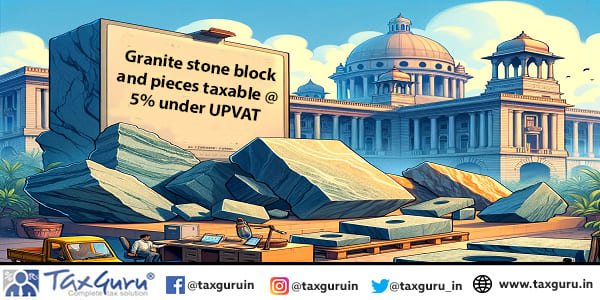Case Law Details
Commissioner Vs Neha Sharma (Allahabad High Court)
Introduction: In a landmark decision, the Allahabad High Court clarified the tax classification of granite stone blocks and pieces, bringing relief to dealers across the region. The case, Commissioner Vs Neha Sharma, revolved around the classification of granite stone under Entry No.109 of Schedule II Part A and its applicable tax rate under UPVAT. The ruling sheds light on the legislature’s intention and provides guidance for the interpretation of tax entries concerning stone materials.
Detailed Analysis:
The heart of the dispute lay in whether granite stone blocks and pieces should be taxed at 5% (including additional tax) under Entry No.109, which primarily includes materials like “sand, gitti, bajri, kankar, stone ballast, stone,” or at a higher rate of 14.5% as unclassified items. The revenue’s stance was that Entry No.109 did not explicitly mention granite stone, hence it should be taxed at the higher rate.

However, the court, led by insights from learned counsel representing both sides, delved into the legislative intent behind the classification entries. The crucial point of contention was the interpretation of the term “stone” within Entry No.109, especially considering the specific exclusions mentioned, such as glazed stone, marble, and marble chips.
Conclusion: The Allahabad High Court’s decision underscores the principle that legislative exclusions must be explicitly stated, and in the absence of such specification, broader interpretations should prevail. By ruling that granite stone blocks and pieces fall under the ambit of Entry No.109 and are taxable at 5%, the court has provided a precedent for similar cases and clarified the tax obligations for dealers dealing in stone materials. This judgment not only resolves the immediate dispute but also aids in the consistent application of tax laws, ensuring fairness and clarity in tax classifications. The ruling is a testament to the judiciary’s role in interpreting legislative intent and providing clear guidelines for the application of tax laws.
FULL TEXT OF THE JUDGMENT/ORDER OF ALLAHABAD HIGH COURT
1. Heard Sri Ravi Shanker Pandey, learned Additional Chief Standing Counsel for the revisionist and Sri Ishir Sripat, learned counsel for the opposite party.
2. The revision petition was admitted on the following question of law:-
“Whether on the facts and circumstances of the case, the Tribunal was legally justified in holding that granite stone block and pieces sold by the dealer is taxable @ 5% (including additional tax) under entry no.109 of the Schedule II Part A as per notification No.KANI-2-421/XI-9(1) dated 31.03.2011, “sand, gitti, bajri, kankar, stone ballast, stone but not including glazed stone marble and marble chips” despite the fact that granite stone has not been mentioned in the said notification, being exhaustive entity?”
3. The case made out by the revenue is that in the classification, Entry No.109 does not include granite stone, and accordingly, the same should be treated as not classified and taxed @ 14.5%.
4. The argument put forward by Mr. Pandey is that Entry No.109 only includes substances that are of less value as the items included therein are “sand, gitti, bajri, kankar, stone ballast, stone”. He submits that granite stone is an expensive item and was never meant to be included in Entry No.109.
5. Entry No.l09 specifically includes “stone” with the caveat that the same shall not include glazed stone, marble and marble chips.
6. On an interpretation of the intention of the Legislature, I am of the view that glazed stone, marble and marble chips have been specifically excluded from the definition of “stone” in Entry No.109. If the Legislature wanted to exclude granite stone, the same could have very well been done by the amendment carried out on March 31, 2011. It is my view that if one were to agree with the submission made by the revenue, one would have to exclude several items that would ordinarily be termed as “stone”, which is not permissible in law.
7. Upon perusal of the order passed by the Tribunal, one finds that the Tribunal has held that stones that have not been processed in any manner, would be included in Entry No.109 whereas processed stones that have gone through some kind of procedure would be excluded. The above finding is in consonance with the fact that glazed stone has been specifically excluded from Entry No.109.
8. In light of the above findings, there is no scope of interference in the well reasoned order passed by the Tribunal, and accordingly, this revision petition is dismissed.
Order Date :- 18.1.2024





